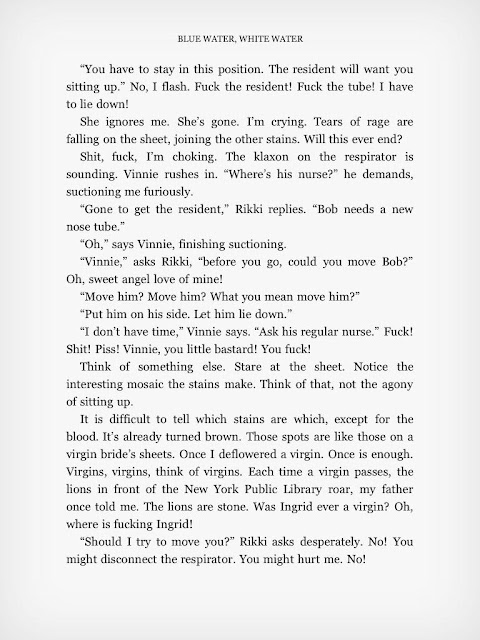Medical non-fiction fascinates me. I couldn't put down The Emperor of All Maladies. I loved The Immortal Life of Henrietta Lacks. I have a whole shelf of books exploring the human body from a sort of poetic anatomical point of view. So that I've read two different illness-oriented autobiographies in the past couple of months isn't too surprising.

 The first was a book called [sic], by one Joshua Cody, which was very well reviewed in the Times, both in the daily paper, and in the Sunday book review. It so irritated me that I scribbled a list of my reactions, and wrote a long blog post about how horrible it was and how awful a person the insufferable, pompous author must be.
The first was a book called [sic], by one Joshua Cody, which was very well reviewed in the Times, both in the daily paper, and in the Sunday book review. It so irritated me that I scribbled a list of my reactions, and wrote a long blog post about how horrible it was and how awful a person the insufferable, pompous author must be.
And then Blogger ate my post. Gone. Completely gone. Normally the fact of having written the post would have exorcised the irritant demon, but not in this case; I wanted the goddam thing PUBLISHED. I wanted my irritation known to the world. Happily, my list was still in the book:
horrified fascination • emperor's new clothes • brittle
self-absorbed • facile • erudite • glittering
monomaniacal • stream of consciousness
hallucinogenic • digressive • infuriating • chronicle of madness
Granted, the guy is smart. He can write. He tosses off the phrase "spindly tessellations" and you shiver with its perfection. But he sounds like a horse's ass, and he definitely doesn't sound like someone you want to hang out with. Oddly enough, he addresses just that issue:
And I wouldn't like it if someone read my book and said, I admire him as a writer, but I would have no wish to meet someone who wrote things like that, or to be friends with someone who would write things like that. When I was writing this, I gave a draft of part of this book to a friend in publishing, and she said she thought the writing was good but warned me that if it's published "you won't be able to have regular relationships anymore." What the hell did she mean by that? Maybe the stuff about girls? And then--as a matter of fact--she never talked to me again.
I think part of my horrified fascination with Cody and his book - and why I even finished the book in the first place - was that he's a composer, he has a graduate degree from Columbia, he lives in New York. I went to Columbia, I have a graduate degree from their music department. And I cannot in my head reconcile this guy with the composers and musicologists who I know, who I knew at Columbia, who live and work in New York. He just doesn't fit. He doesn't make any sense. The graduate students at Columbia are living hand to mouth in roach-infested student housing; they aren't drinking martinis in bars in the East 20s and screwing strippers.
Skip [sic]. I read it so you don't have to.

 On the other hand, you may well want to read Blue Water White Water. [Here - here's the beginning.] It's a mesmerizingly fast read about a guy with Guillain–Barré syndrome - paralyzed in the hospital, trapped in his own body and only able to communicate by flicking his eyeballs from side to side. Somehow, he captures the vicissitudes of his ordeal with a sharp, unsentimental, first person eye - horrible nurses, wonderful caretakers, insane pieces of medical equipment, months of boredom, rage, nostalgic memories. The book is breathtaking, the kind of book you read in one gulp. Even though you know the ending, you keep turning the pages. Here, here's another sample, from towards the end:
On the other hand, you may well want to read Blue Water White Water. [Here - here's the beginning.] It's a mesmerizingly fast read about a guy with Guillain–Barré syndrome - paralyzed in the hospital, trapped in his own body and only able to communicate by flicking his eyeballs from side to side. Somehow, he captures the vicissitudes of his ordeal with a sharp, unsentimental, first person eye - horrible nurses, wonderful caretakers, insane pieces of medical equipment, months of boredom, rage, nostalgic memories. The book is breathtaking, the kind of book you read in one gulp. Even though you know the ending, you keep turning the pages. Here, here's another sample, from towards the end:

Read it. And hope that you never end up there.




















